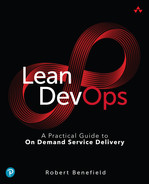Acknowledgments
I am far from a natural at writing a book. Its linear format feels overly constraining to the way that I think. Books also feel like a permanent record, while life to me feels more like a constant quest to test ideas, gain knowledge, and correct mistakes to improve yourself and, if you are lucky, maybe make the world a little bit better along the way.
This made creating this book rather arduous. In my desire to help you, the reader, get the most coherent message, I spent an inordinate amount of time rewriting and shuffling content around. I probably would still be at it today if it weren’t for the immense help and patience of several key people along the way.
The person most central to helping turn this book into reality, and the one who drew the great illustrations in this book, is my wife and partner-in-crime Gabrielle Benefield. With her product innovation background and my delivery experience, we constantly challenge each other to understand what so often goes wrong with teams and organizations in order to find the best way to help others sustainably deliver the outcomes that really matter. This book, along with the Mobius Loop innovation framework, have come out of years of deep discussion and collaboration to bring out the best in people in order to overcome the problems and dysfunction that so often thwart organizational success.
I also cannot thank Mary and Tom Poppendieck enough for their help and inspiration throughout this process. Both so generously spent the time challenging me to dig deep into my experiences to try to best convey to the world why the key pillars of this book are so critical to DevOps success.
I want to extend a special thanks to Colonel David A Hopley OBE RM (Retd). I learned and adopted many of the principles of Mission Command by working alongside many talented military veterans early on in my career. Despite my hazy awareness of their origins and understanding of the nuances that make them so effective, the approach not only resonated with me but always seemed to work better than traditionally run teams. Being the formal commanding officer of the UK Special Forces (SBS) and as a member of the teaching staff at the Joint Services’ Defence College, Colonel Hopley helped improve upon my lay description of Mission Command.
I also want to thank those who hung in through thick and thin reviewing the many iterations of the manuscript, some who also spent several hours helping me clarify my often-jumbled thoughts. This includes: Steve Freeman, James Duncan Davidson, David McNab, Jeff Sutherland, and Tim Beattie. I am also grateful for the patience of the editorial and production team at Addison-Wesley, including: Haze Humbert, Chris Guzikowski, and Menka Mehta. Your help turned this book into something that I am proud of.
Finally, there are a number of people who were instrumental as sounding boards to help clarify many of the ideas in this book, including (in no particular order): Peter Webb, Priit Kaasik, Heikko Ellermaa, Martin Sulg, Ainar Sepp, Sarah-Jane Mason, Chris Matts, Ademar Aguiar, and Henrik Kniberg. You helped me express why the approaches in this book not only work, but can help others on their own journey to learn, improve, and maybe make the world a little bit better for all of us.
